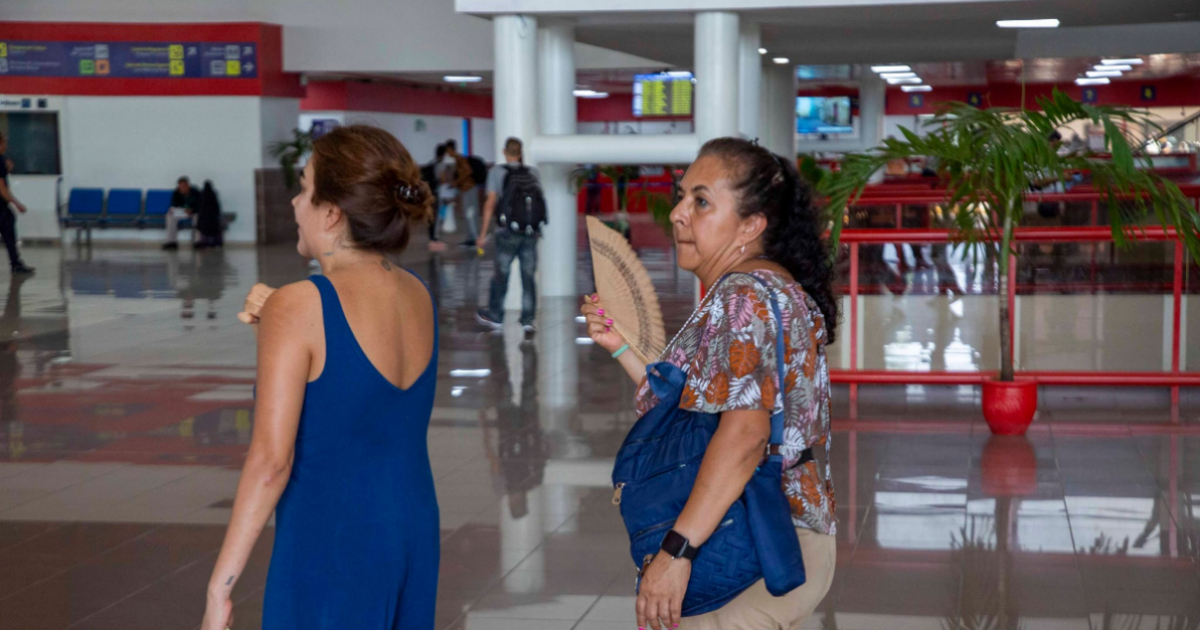
The issue of climate control at Terminal 3 of José Martí International Airport in Havana was partially resolved last Thursday with the activation of one of the two cooling units in the centralized air conditioning system.
Eduardo Rodríguez Dávila, Cuba's Minister of Transportation, announced on the social media platform X that the reactivation of one of the two cooling units has resulted in "an improvement in the temperature across various areas."
The head of the department clarified that this is not a solution to the problem affecting passengers since last May, but he presented the implementation as an "important step toward restoring the climate system of Terminal 3 and its subsequent modernization."
Rodríguez noted that, although several state-owned companies were involved, it was necessary to turn to the private sector, mentioning the SMEs "Fabricación Construcción Mantenimiento y Reparación CA & CM SRL," which specializes in this type of work, and RECLITEC, responsible for the chemical cleaning of the condenser, among others.
The minister shared a more comprehensive and detailed explanation of the work carried out at the airport on Facebook.
He stated that Terminal 3 requires a cooling capacity of 1,200 tons, provided by a centralized system of two chillers, each with a capacity of 600 tons. These units cool water to 7 °C, which is then distributed through ducts to cool the passenger areas by exchanging temperature with the air.
However, he justified the recent problems by citing ongoing exploitation, delays in maintenance, and the poor quality of the water being used.
Furthermore, he emphasized that the arrival of summer worsened the situation, prompting the decision to acquire two new chillers, although their delivery was delayed, and comprehensive maintenance was initiated on one of the existing units.
On the other hand, it was also decided to install 12 rooftop air conditioning units to complement the cooling system, intended for critical areas such as the final waiting area and the baggage claim zone.
However, the installation became complicated due to the need to build specific foundations and pipelines, which led to additional difficulties and delays in its operation, Rodríguez explained.
During the maintenance of the first chiller, the second one malfunctioned, leaving Terminal 3 without central air conditioning, which increased the discomfort for passengers and staff. Currently, the first chiller is operating at 85% of its capacity, and efforts are underway to integrate the second chiller and enhance cooling capacity in the coming days.
He announced that a third chiller is currently being prepared to enhance the reliability of the system, and the capital reconstruction of all equipment has been contracted as part of a gradual plan that will culminate in 2025 with the arrival of new equipment.
Finally, he noted that the installation of the 12 rooftop units is ongoing, with six of them already operational.
Recently, Cuban journalist Elizabeth Cánova recounted the various challenges she faced during her journey from Havana to Madrid, which included witnessing Chinese tourists fainting at Terminal 3.
Through her Instagram account, the presenter and model began by saying that “this was a video she didn’t want to record, because it feels like kicking a fallen tree, but how embarrassing for Cuba.”
After the brief introduction, Cánova stated that since his arrival there had been no air conditioning: “Can you imagine, with the heat in Cuba, plus the hours of waiting because the system was overwhelmed, the consequences that brought?”
Filed under: